- Home
- Leslie Meier
LStone 20 - Easter Bunny Murder Page 5
LStone 20 - Easter Bunny Murder Read online
Page 5
“We’re the temporary kitchen help,” said Lucy. “I’m Lucy Stone and this is Sue Finch.”
Willis looked them over. “I guess you’ll do,” he said with a sniff.
“We’ll more than do,” said Sue. “You’re lucky to have us. I’m a top-notch cook—and Lucy is, too.”
Lucy blushed at this surprising praise from Sue.
“I recently won a prize for my blueberry cheesecake,” said Lucy, who had been the unexpected winner at a Valentine’s Day dessert contest.
“No need to rub it in,” whispered Sue, who was still a bit miffed that her fabulous brownies didn’t take the prize.
The two women followed Willis down a rather dim hallway, where every other light fixture was turned off. “Why the gloom?” she asked, raising her voice.
“We’re saving energy,” said Willis, opening a door and standing aside for them to enter.
They found themselves in a businesslike office, where Willis had the necessary paperwork waiting, for their social security numbers and signatures. “As day workers, you are considered independent contractors so no payroll taxes will be deducted from your compensation. I believe we have already agreed on the hourly wage.”
“Lucy may have, but I don’t believe I have,” said Sue, lifting her chin. “My rate is fifteen dollars an hour.”
Willis’s eyes widened and he pressed his lips together. “Then I’m afraid we will not need your services,” he said, picking up Sue’s paperwork and preparing to rip it up.
“She’s just kidding,” said Lucy, glaring at her friend.
“Can’t blame me for trying,” muttered Sue, taking the papers from Willis and scrawling her signature in the highlighted space. “This is how the rich get richer and . . .”
Lucy delivered a gentle kick to Sue’s shin. “Where’s the kitchen?” she asked brightly.
“Follow me,” said Willis, as if he were a docent leading a museum tour.
The kitchen was at the end of the hallway and looked to Lucy as if it had come straight out of a PBS period drama. Windows placed high on the walls allowed plenty of light, which revealed rather grimy, grease-stained walls and ceiling. An enormous black coal stove dominated the room, but a small electric stove stood next to it. A large wooden table in the center of the kitchen was the primary work space; an old-fashioned white porcelain sink with exposed plumbing beneath hung from a wall. Another wall was occupied by several refrigerators and wire racks that held provisions as well as pots and pans.
There was no sign of Elfrida.
“Where is that damned woman?” muttered Willis. “Never here when you want her.”
“Looking for me?” Elfrida appeared in one of the numerous doorways leading off the kitchen, wiping her hands on a dishtowel. “I was just washing up the lunch things.”
You had to hand it to the woman, thought Lucy. Even in a stained white apron and an ill-fitting pastel green uniform, she looked spectacular. It didn’t hurt, of course, that the uniform was too tight across her bounteous breasts, and the requisite hairnet barely contained her wavy blond hair, which escaped in wisps that curled charmingly around her heart-shaped face. Even with her feet shod in rubber kitchen clogs, her amazing legs were, well, amazing.
“These ladies are here to help with preparations for tomorrow’s reception,” said Willis. Something in his tone made Lucy feel as if she should curtsy.
“Oh, I know Lucy and Sue,” said Elfrida, giving them each a hug. “Now let me get you girls some aprons. Who’s washing and who’s baking?”
“Lucy will be washing,” said Sue in her teacher’s voice.
“That’s right,” said Lucy, resigned to her fate.
Elfrida took her hand and led her to a room off the kitchen—which Lucy supposed was the scullery—where a lonely, aged dishwasher stood among stacks of plates, cups, and saucers, and row upon row of crystal glassware. Lucy had never seen anything like it, except perhaps at the china shop at the outlet mall. “Do you have any rubber gloves?” she asked.
Several hours later, Lucy dried the last crystal sherry glass and placed it on a tray, among dozens of others neatly lined up like soldiers on parade. The gold-rimmed plates were neatly stacked, ready to be carried upstairs, as were the cups and saucers. Lucy shook out the dishtowel she’d been using and hung it with several others on a wooden rack to dry. Then she went into the kitchen to see if Sue needed help.
“How’s it going?” she asked.
Sue turned off the electric mixer. “What did you say?”
“Do you need any help?”
“Sure do. The oven is full, but you could get started on those sandwiches. I’ve boiled up a couple dozen eggs—you could make egg salad. There’s also tuna, a tiny bit of smoked salmon—oh, and there’s radishes that need to be scrubbed.”
Lucy had been to enough receptions at the Quissett Yacht Club to be familiar with radish and butter sandwiches, a true WASP delicacy. “So I shouldn’t bother looking for the caviar?”
Sue laughed. “No caviar. This is the economy buffet.”
Lucy was shelling the eggs, sniffing at the unpleasant sulfur smell, when one of the nurses popped in. “Whew!” she exclaimed, speaking with a slight Spanish accent. “What a stink!”
“Eggs,” said Lucy, going on to introduce herself and Sue. “We’re helping out for the funeral.”
“I’m Sylvia Vargas,” said the nurse, a plump woman in her late twenties, dressed in blue scrubs and white clogs. “I take care of Mrs. Van Vorst.” She looked around. “Where’s that cook?”
“I think she stepped outside for some fresh air,” offered Sue, who was pouring batter into a cake tin.
“Fresh air! She’s smoking!” Sylvia shook her head. “A cook who smokes! Can you believe it?” She stalked over to the outside door and yanked it open, then stepped through, leaving it ajar. “Elfrida! Don’t you know smoking is bad for you? You’ll get cancer!”
Lucy and Sue could hear the conversation clearly; their eyes met, and they both smiled.
“You didn’t come all the way down here to warn me about smoking,” said Elfrida.
“No. I want to know why you switched brands on Mrs. V’s nutrition drink. This new one tastes terrible.”
“Mr. Weatherby said the other stuff was too expensive,” said Elfrida. “He said to get the generic stuff.”
“I should make him drink it,” said Sylvia, coming back inside. She opened the refrigerator and extracted a can of the stuff, then left the kitchen. A moment or two later, they heard her arguing with Willis in the hallway.
“No way!” Sylvia was saying, in no uncertain terms. “I’m a nurse, not a cleaning lady! And, by the way, this nutrition drink is expired. It’s past the sell-by date.”
There was a low male murmur; Lucy and Sue couldn’t quite make it out. Determined to hear the conversation, Lucy went over to the swinging door and pushed it open a tiny bit with her foot.
“Perhaps you could consider it a favor to Mrs. Van Vorst,” Willis was saying. “She certainly wouldn’t want visitors to see the house at less than its best. She would fret. It might even be bad for her health.”
Sylvia was laughing. “Good try, but once again, may I remind you that I am a professional, highly educated, registered nurse. Cleaning is simply not part of my job description. If you want the house cleaned, you’ll have to hire more cleaners. Tracy can’t do it all herself.”
“I wish I could,” said Willis. “You know the situation as well as I do. Mr. Weatherby will not approve another penny for this funeral. I had a hard enough time convincing him to let me hire those two kitchen helpers.”
Lucy looked at Sue, who raised her eyebrows.
“I don’t want to hear it, Willis. That’s your problem. All I do is take care of Mrs. V. Meds, temps, blood pressure, that’s my job. Oh, and by the way, Yum-Yum peed on the carpet again, and as I’ve told you before, cleaning up dog messes is not my job!”
“Not my job, not my job,” muttered Willis, and Lucy hopped back
to the sink and her eggs. She was peeling one when he entered the kitchen and grabbed a bottle of cleaning liquid and a roll of paper towels.
“Oh, Mr. Willis,” she said in a bright voice. “I’ve finished washing the plates and glasses—would you like me to carry them upstairs?”
Willis stared at her, mouth open in surprise. “That would be a great help,” he said. “Follow me.”
Lucy did, scurrying behind him as he zoomed down the long hall and began climbing up a scuffed back stairway and down yet another dimly lit hallway. He finally opened a door and Lucy found herself stepping into the dining room. The large central table had been moved to the side of the room and other smaller tables had been placed in a row in front of the French doors; folded damask tablecloths were lying on each table. Beyond, through the open double doors, she glimpsed an elegantly decorated room, where piles of chairs were stacked here and there. “The drawing room,” he said. “That is where the service will take place.”
Lucy nodded, taking in the dining room’s arrangement. “Cakes and sandwiches on the big table, beverage service on the smaller ones?” asked Lucy.
Willis’s eyebrows shot up. He seemed surprised at Lucy’s competence and it took him a moment to respond. Finally, he nodded. He made an odd figure, dressed in his formal outfit and clutching the cleaning equipment, and Lucy saw he was not the imperturbable butler she had thought he was, but a man who was struggling to do the best job he could in difficult circumstances.
“I’ll get started,” she said, shaking out a tablecloth and spreading it on one of the smaller tables.
Willis cleared his throat. “You and your friend seem to be very capable,” he said. “Would you be interested in working tomorrow, serving and cleaning up?”
Lucy jumped at the opportunity, but she wasn’t at all sure about Sue. “No problem,” she said, crossing her fingers. “We’ll be here.”
Willis nodded and departed to clean up after Yum-Yum, and after a moment’s hesitation, Lucy went to the doorway, watching as he climbed the carpeted staircase. When he was out of sight she quickly followed, tiptoeing across the tiled hall where the center table was bare, without the valuable Karl Klaus sculpture. Lucy wondered if Jelly Beans was normally kept in storage between events, as she continued up the carpeted stairs. Reaching the spacious hallway upstairs, she noticed one of the many paneled doors was slightly ajar and went over to it.
As she stepped closer, she was aware of a stale, rank scent emanating from the room, as if the windows hadn’t been opened in a long time. Peeking through the slight gap into the dimly lit room, she had a glimpse of VV’s head, propped on a pile of pillows. Her hair, now white, seemed flat and heavy, and her cheeks were sunken. Her nose jutted out sharply and was her most prominent feature. One scrawny hand, like a claw, rested on the bedcovers.
It was a shocking sight and Lucy withdrew, hurrying back down the stairs. She didn’t know what she’d expected. She’d heard VV was not doing well, but she hadn’t expected to see this corpselike creature. The image was still fresh in her mind as she continued down the service stairs to the kitchen, intending to start bringing up the clean crockery and glassware.
“Goodness,” said Sue, looking up from her mixing bowl. “You look like you’ve seen a ghost.”
“Almost,” said Lucy, slipping into a chair. “I saw VV.”
“Was it bad?” Sue was pouring cake batter into a loaf pan.
Lucy nodded. “Really bad. This isn’t right.”
“What do you mean?” asked Sue, scraping out the last globs of batter from the bowl.
“I only got a glimpse, but she looked like a skeleton. Her hair was nasty—looked like it hasn’t been washed in weeks.” Lucy swallowed. “Her room stinks.”
“That doesn’t make sense.” Sue shoved the pan into the oven and shut the door. “That nurse, Sylvia, seems competent enough.”
“She was arguing with Willis. You heard them. There’s not enough help to keep the place clean, they’re skimping on VV’s nutrition, it’s crazy. I don’t see how you go from being a millionaire to having to drink expired cans of nutrition drink in just a few years. She can’t have lost all her money.”
Sue was already creaming butter and sugar together with the electric mixer. “If you ask me,” she said, raising her voice over the hum of the motor, “I don’t think she’s lost her money at all. After all, the stock market is the one thing that’s recovered in this recession. I think somebody else wants it and has decided it’s time for VV to go.”
“That’s absolutely horrible,” said Lucy, picking up a tray of crystal stemware and beginning the long trek to the dining room upstairs.
When she got there, she found a middle-aged woman pushing a vacuum back and forth on the Persian rug. Seeing Lucy awkwardly negotiating through the doorway with the heavy tray, the woman switched off the vacuum and went to help.
“Here you go,” she said, holding the door for her.
“Thanks,” said Lucy, setting the tray down on the nearest table. “That stuff is heavy, and I’ve only got about ten more trays to go.”
The woman smiled. “I’m Tracy,” she said. “You must be new here.”
“Lucy Stone. I’m helping out for the funeral.”
Tracy’s eyebrows shot up in surprise. “Really? Extra help? I can’t believe that cheapskate Weatherby okayed spending the money.”
“Not much money,” grumbled Lucy, whose back was already beginning to bother her. “Oh, well, back to the mines . . .”
“Hold on,” said Tracy. “There’s a dumbwaiter.”
“A what?” asked Lucy.
“One of those mini-elevators. I’ll show you.” Tracy led the way to a small room off the dining room. “This is the butler’s pantry, and this,” she said, opening a cabinet door, “is the dumbwaiter.” She pushed a button on a control panel and the shelved unit sank out of sight, revealing an empty shaft. “It goes down to the kitchen.”
“Elfrida never told me,” exclaimed Lucy.
“She probably doesn’t know. It goes upstairs, too, to the master bedroom.”
“How handy,” said Lucy.
“It is handy, but they don’t use it much, now that VV doesn’t entertain anymore. The dining room hasn’t been used for ages.”
“Do the nurses use it?” asked Lucy.
Tracy shook her head. “They’d rather go down to the kitchen themselves. It makes a change, you know? Otherwise, they’d be stuck in that room all day.”
“Well, thanks,” said Lucy. “This will make my job a lot easier.”
She turned to go back down to the kitchen to load the dumbwaiter when one of the French doors opened and a thirtyish woman entered, carrying a potted orchid, and stepped carefully around the temporary tables. She was dressed for outdoor work, in jeans and a barn jacket, with sturdy duck boots on her feet.
“Hi, Tracy,” she said, smiling over the nodding pink blooms. Her brown hair was pulled back in a ponytail, and her cheeks were pink. She carried with her a scent that Lucy, a keen gardener, recognized. It was the scent of newly turned earth and green leaves, fresh air and sunshine. “Where do you want these?”
“I don’t know. You better ask Lucy, here. She’s in charge of the arrangements for the collation.”
Lucy laughed, introducing herself. “I don’t think I’m in charge of anything. I’m just helping out for a day or two.”
“I’m Izzy Scannell. I’m supposed to be the head gardener, but I’m down to one helper, which means I’m more of a yard worker. Lately, I’ve been cleaning out the beds and weeding; pretty soon I’ll be mowing. It’s just maintenance now, no more experiments with the perennial bed, no more additions to the water garden.”
“That’s a beautiful orchid,” said Lucy.
“It’s a good thing orchids are tougher than they look—they’re about all I’ve been able to keep going in the greenhouse. Now they’re earning their keep, as we won’t have to order expensive arrangements from a florist.”
; “That should please Mr. Weatherby,” said Lucy.
Izzy shot her a questioning glance. “What do you know about Mr. Weatherby?”
Lucy smiled. “I’ve only been here a few hours, but I’ve heard plenty about how cheap he is.”
“You can say that again,” said Izzy. “He’s made me lower the temperature in the greenhouse and he’s been, as he says, ‘concerned’ about the cost.”
Tracy chuckled. “Sounds like you’re in trouble,” she said, unplugging the vacuum and pushing it into the next room.
Izzy twisted her lips into a sardonic grin. “She’s right. Expressing ‘concern’ is the first step around here. I think it’s time for me to look for a new job before I’m fired.”
Lucy was spreading another tablecloth. “Perhaps he’ll be so taken with your orchids that he’ll reevaluate.”
“I’m not holding my breath,” said Izzy, nodding at a wheelbarrow full of blooms that was on the terrace, just outside the French doors. “So where do you want me to put them?”
Lucy asked her to set the plants on the floor, planning to add them as a final touch after she’d arranged the plates, silver, and glassware. Then she went back downstairs for another load of tableware, wondering exactly how she was going to convince Sue to agree to work a second day at Pine Point.
Chapter Six
The Pennysaver with Lucy’s photo of the EMTs working over the collapsed figure of Van Duff was lying on the table in Jake’s Donut Shop. The rescue workers’ bodies blocked his head; all that could be seen of Van were his plush-covered legs and feet. TRAGEDY AT EGG HUNT, read the headline.
“It is a tragedy,” said Rachel Goodman, shaking her head. Her long black hair was caught in a loose bun that wobbled and her big brown eyes were mournful. “Some of those children are going to be scarred for life. They saw the Easter Bunny, an iconic figure, collapse right in front of them. Talk about trauma!” Rachel was a psych major in college, and had never gotten over it. She was one of the four friends who gathered at Jake’s, where the coffee was strong and the conversation even stronger, every Thursday morning for breakfast.

 Christmas Card Murder
Christmas Card Murder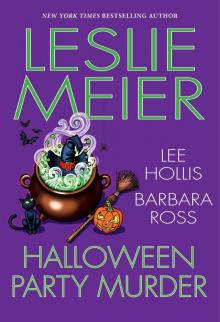 Halloween Party Murder
Halloween Party Murder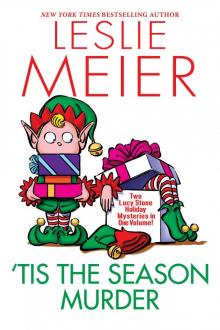 'Tis the Season Murder
'Tis the Season Murder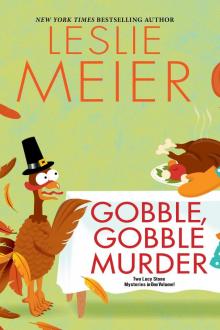 Gobble, Gobble Murder
Gobble, Gobble Murder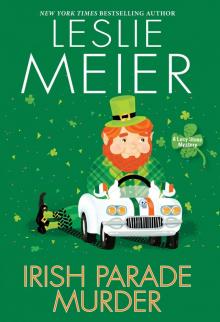 Irish Parade Murder
Irish Parade Murder Bake Sale Murder
Bake Sale Murder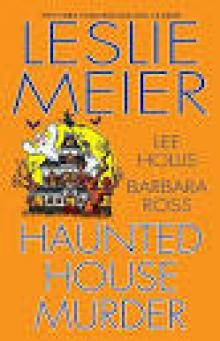 Haunted House Murder
Haunted House Murder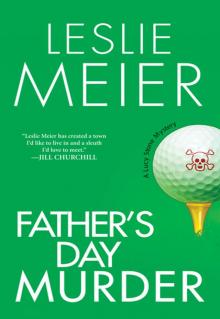 Father’s Day Murder
Father’s Day Murder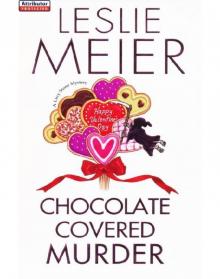 Chocolate Covered Murder
Chocolate Covered Murder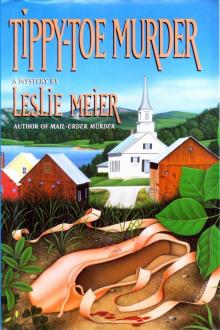 Tippy Toe Murder
Tippy Toe Murder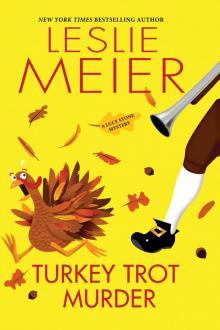 Turkey Trot Murder
Turkey Trot Murder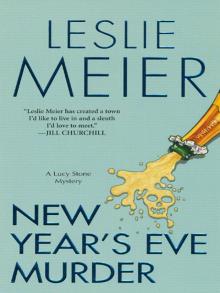 New Year's Eve Murder
New Year's Eve Murder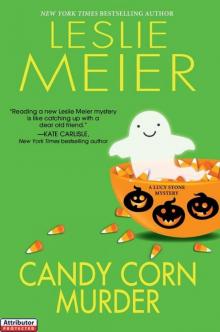 Candy Corn Murder
Candy Corn Murder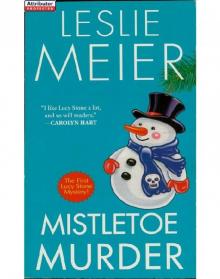 Mistletoe Murder
Mistletoe Murder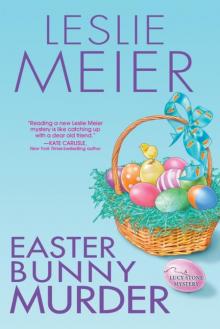 LStone 20 - Easter Bunny Murder
LStone 20 - Easter Bunny Murder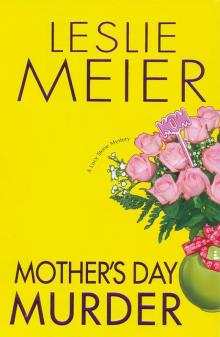 Mother's Day Murder
Mother's Day Murder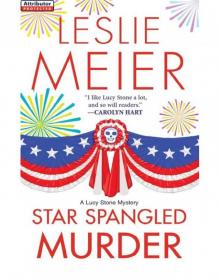 Star Spangled Murder
Star Spangled Murder Silver Anniversary Murder
Silver Anniversary Murder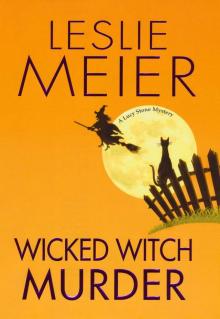 Wicked Witch Murder
Wicked Witch Murder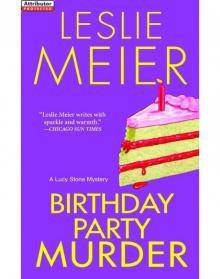 Birthday Party Murder
Birthday Party Murder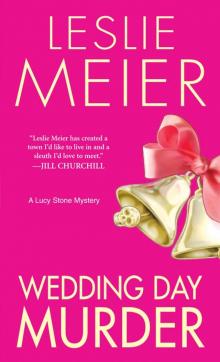 Wedding Day Murder
Wedding Day Murder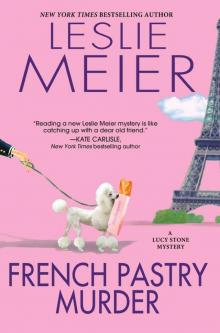 French Pastry Murder
French Pastry Murder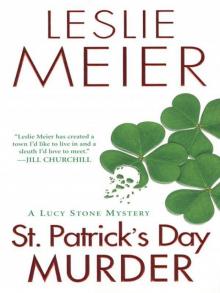 St. Patrick's Day Murder
St. Patrick's Day Murder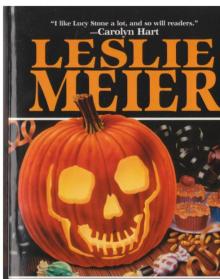 Trick or Treat Murder
Trick or Treat Murder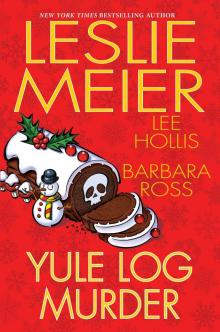 Yule Log Murder
Yule Log Murder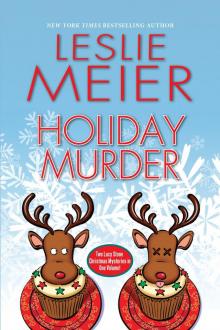 Holiday Murder
Holiday Murder British Manor Murder
British Manor Murder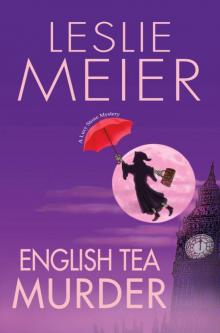 English Tea Murder
English Tea Murder